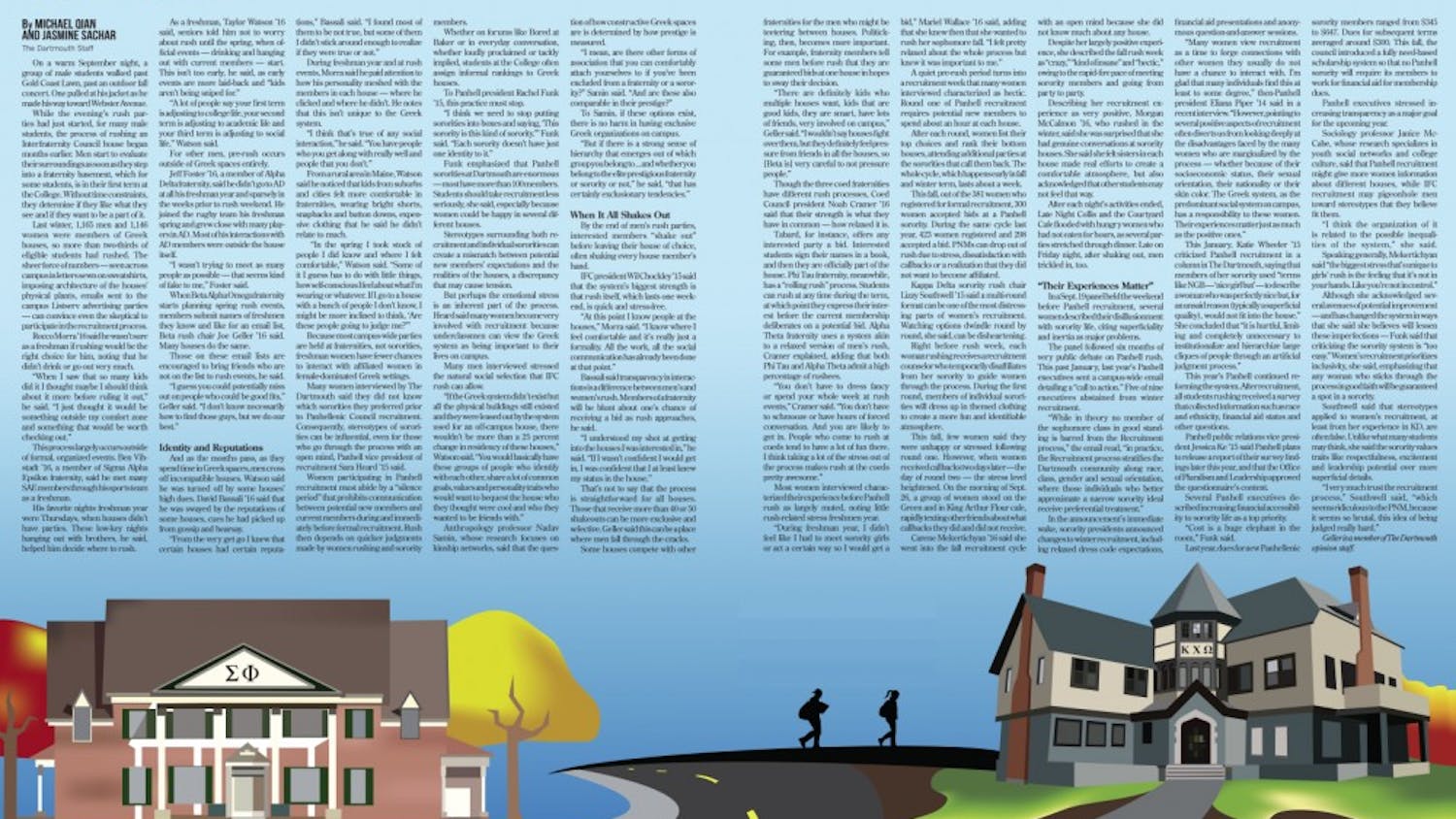With all of the passion, history and testosterone that come with the fraternity debate at Dartmouth, it’s hard to remain impartial and not be swept up in the issue’s politics and intricacies. Although for me, I suppose it’s a little easier not to generate too many opinions when I’m not actually allowed in.
Fraternities have been present on Dartmouth’s campus in some form or another since before the drafting of the Constitution. In 1787, inspired by the formation of secret societies at Harvard and Yale, the literary society “Alpha of New Hampshire” was born.
Immediately, more societies formed, including the Social Friends and the United Fraternity. The recruitment process rapidly escalated in intensity — entrance into these groups became so competitive that in 1814 the College intervened and limited these two groups to recruiting from separate halves of the alphabet.
In 1825, the College further enforced this stipulation by assigning students to fraternities based on last name. This crippling of the literary societies paved way for the emergence of the still-standing Greek system in 1842, with the founding of Psi Upsilon and Kappa Kappa Kappa fraternities.
Even 200 years ago, fraternities often found themselves as sources of controversy. The issues haven’t changed much, either. In addition to concerns about the competitiveness of the rush and recruiting process, the concept of pledging came under fire as early as 1849. It had no true enforcement measures and proved ineffective in that time.
The tenure of then-College President William Jewett Tucker proved to be a heyday for Greek life, with eight new societies formed between 1893 and 1909.
If there’s one thing with which everyone at Dartmouth — past or present — can agree about fraternities, the system is resilient. In 1855, 64 percent of men were members of Greek organizations, and in the early 1970s, fraternities attracted the membership of 70 percent of male students.
In 1966, fraternities provided fresh bait for critics, as a series of “obscene skits” caused outcry in the Dartmouth community, and drew the ire of then-Tucker Foundation dean Richard Unsworth, who expressed his displeasure at Rollins Chapel on Jan. 17 of that year.
Unsworth did not mince words, calling the actions of the fraternities “a patch of social dry rot exposed to view.” Additionally, he criticized the College’s “laissez-faire” position on the lives of students in not intervening up to this point, and pointed a finger at the exclusivity of fraternities and how these largely homogenous groups encouraged conformity.
“It is the rare fraternity that accepts as a goal the inclusion of all sort and conditions of men,” he said, advocating for the establishment of an “alternative social facility” that would fall outside Greek life.
Aside from this isolated incident, though, relations between the fraternities and the College remained fairly peaceful for the following decade.
That all changed in 1978. English professor James Epperson, fed up with the widespread hazing that was commonplace at the time, launched a campaign to shut down fraternities once and for all.
Forums and debates were held on campus, with both professors and students arguing their side in front of an audience. Eventually the issue was put to the faculty for a vote, with the final tally 67-16 in favor of abolishment. Of course, a vote of professors had no actual meaning other than to confirm what was already assumed about their sentiments.
Abolishing such an integral part of campus life was a change that only could be made by the College’s Board of Trustees. The trustees took this vote, weighed it and decided to do nothing. They opted to attempt to improve the image and smooth out some rough edges of the system as a whole, but they effectively decided that fraternities would remain unscathed.
In 1999, the issue re-emerged in a poll conducted by The Dartmouth on whether to eliminate a system of single-sex Greek houses. This time there was a slightly narrower margin, with 58 percent of faculty in favor of the abolishment of fraternities. However, an overwhelming 75 percent responded that the system had a negative effect on Dartmouth’s “intellectual environment,” so clearly they still were not pleased.
This time, several professors made their voices heard about their stance on the most recent proposal.
Then-engineering professor Keith Paulsen, while not in any way condoning students’ behavior, called into question the placement of the blame. He believed that students will party, sometimes excessively, and that the frats just happened to be their outlet for doing so at the time.
“The drinking and partying orientations [of students] are not coming from frats, although though they do provide an atmosphere. Students choose to behave in those ways,” Paulsen said.
Not only had there not been a significant shift in the attitudes of faculty since 21 years earlier, there was a similar lack of difference in the opinion of the board. If you haven’t noticed, fraternities are still here.
Epperson once said, “The reforms that have periodically been attempted, as I’ve tried to explain, have lasted a few years and perhaps served the purpose for that time and then have been forgotten,” a theme that seems to run throughout campus history.
Whether you regard the Greek system as a harmless “atmosphere” or “dry rot” (or somewhere in between, although isn’t that kind of a cop-out?), one thing that’s not up for debate is the system’s integral role in campus life since the 18th century. And due to its importance, the least students can do is be well-informed in order to find their place either within or without the confines of “going Greek.”


